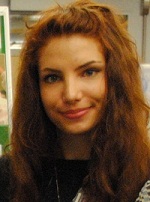Research on BPA Found in Baby Bottles Takes MMC Student to National Experimental Biology Meeting

Alexandra Tarasenko ’12
Tarasenko began her research in fall 2010, in conjunction with the New York City Partnership to Advance Science (NYCPAS), an MMC program fostering mentoring relationships between postsecondary and high school science students made possible by a Congressionally directed grant to establish the Geraldine Ferraro Center for Educational Excellence in Science, Technology and Mathematics. In the initial project, Tarasenko mentored Staten Island Technical High School students Ramona Bleadea and Paige Podlucky, who were selected as winners for their project “Stop! Think before you heat: a study about bisphenol-a leaching from plastic containers into liquids.” In their study, they explored whether or not older plastic containers leach more BPA than those in current production. Despite general improvements, their results implied that BPA still leaches from plastics, including those claiming to be “microwavable” and “BPA Free.”
“Since we found the initial results interesting, we decided to continue this research project and focus it more on baby bottles,” Tarasenko said. “It is very dangerous for children to ingest chemicals, such as BPA, because it can mimic estrogen and interact with one’s endocrine system, and therefore bind to estrogen receptors that can cause an earlier onset of puberty in girls and possible infertility in both men and women. In men, accumulation of BPA can lead to prostate cancer and low sperm count. Parents who expose their children to BPA, weather it being through baby bottles or accumulation in breast milk—from the mother consuming products that contained BPA—put their children in danger of having abnormal neural growth and behavior. These include autism, attention-deficit hyperactivity disorder (ADHD) and schizophrenia.”
BPA is a toxic chemical that is added to plastics to increase their durability. Together with Chair of the Sciences Division Benedetta Sampoli Benitez, Ph.D., Tarasenko is testing the amount of BPA that leaches out of common plastics into liquids that are being heated by microwaving. Preliminary results have shown that milk was less likely to absorb BPA than water when heated in a microwave.
“The results were scary because I had drank from these kinds of bottles as a child that had released all these chemicals,” Tarasenko said, “and when I tested the amount of chemicals I was exposed to as a child, I was shocked. Parents will want to be reassured that bottles today are much safer when it comes to BPA. Testing real conditions that are frequently used at home will inform parents if it is safe to go to their neighborhood store, buy a baby bottle that is claimed ‘BPA-free,’ go to the supermarket for milk, and feed it to their baby, knowing that their toddlers are not exposed to chemicals mimicking hormones. I want to help parents know if local resources, such as currently produced baby bottles and various milk, formula and juices, provide them with the safety from BPA.”
Co-sponsored by the American Society for Biochemistry and Molecular Biology (ASBMB), Experimental Biology is an annual gathering of six scientific societies, including the American Association of Anatomists (AAA), the American Physiological Society (APS), the American Society for Biochemistry and Molecular Biology (ASBMB), the American Society for Investigative Pathology (ASIP), the American Society for Nutrition (ASN) and the American Society for Pharmacology and Experimental Therapeutics (ASPET). The meeting provides a forum for leading scientists, undergraduates and graduate students to showcase their work. In past years, Experimental Biology has attracted more than 14,000 attendees, the vast majority of whom were scientists.
Marymount Manhattan College is an urban, independent, liberal arts college. The mission of the College is to educate a socially and economically diverse student body by fostering intellectual achievement and personal growth and by providing opportunities for career development.
Published: March 19, 2012
